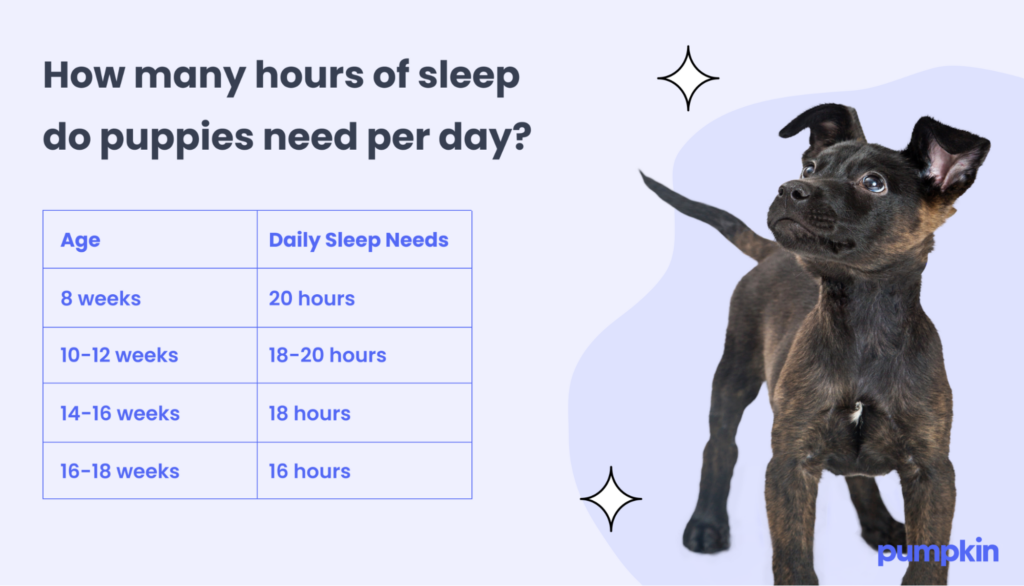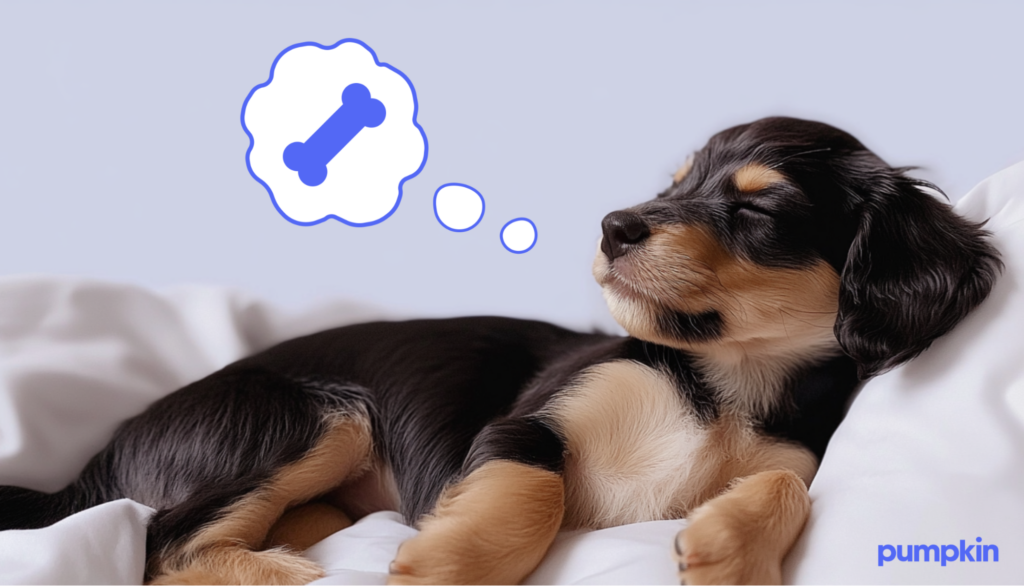Key Points
- Puppies sleep anywhere from 16 to 20 hours per day.
- Healthy sleep patterns are important to establish with your dog while they’re a puppy.
- A good sleep schedule may help your puppy sleep through the night sooner.
Is there a more adorable sight in all the world than a tiny little puppy curled up in your lap, dreaming their little puppy dreams? That’s a rhetorical question — we know there isn’t. But bringing home a new puppy does spark lots of questions, starting from your first night together. You’ll quickly realize your puppy likes to sleep — a lot.
Most new puppy parents wonder just how much their puppy should be sleeping. How much is too much? And how much is too little? Just like with a human baby, sleep is critical for your pet’s cognitive and physical development, so establishing a good sleep schedule is an essential component of caring for your pup. Let’s take a look at a typical puppy sleep schedule so you know what to expect.
How much do puppies sleep by age?
Newborn puppies come into the world totally dependent on their mothers. They’re born blind, deaf, and have very little control over their muscle movements. They spend as much as 16-20 hours per day sleeping.
As puppies grow, they sleep less and explore their world more. For example, your 8-week-old pup may need as much as 20 hours of sleep daily, which will taper down to around 18 hours by 12 weeks. At 18 weeks, most pups are sleeping around 16 hours per day.
Your dog’s breed, age, diet, and activity level will also affect their sleep needs.

These early weeks are a critical time in your pup’s development. They’ll be adapting to a feeding schedule, learning social skills, starting basic puppy training, and learning other lessons. They require plenty of sleep to get all those new behaviors and routines to stick.
Pet Pro Tip: New kitten owners often underestimate the long-term costs of veterinary care for a pet’s unexpected accidents & illnesses. Make sure you get your kitten insured as soon as possible!
Puppies spread their naps throughout the day and night, sleeping 30 minutes to 2 hours at a time. Very young pups will nap at a higher frequency, often every hour. As they grow, nap frequency will dwindle.
The importance of good puppy sleep habits
Puppies require more sleep than the average adult dog to accommodate all of their growth and development, such as:
- Brain development: Your puppy’s brain processes new information while they are sleeping. Puppies that get enough sleep focus better and have a happier disposition.
- Energy conservation: Sleep time conserves the energy levels needed to build bones, strengthen muscles, and help body systems mature.
- Immune system development: Sleep helps puppies build their immune function, keeping them safe from illnesses.
Factors like stress, medical issues, teething, and bathroom needs can impact your puppy’s sleep quality and development. If your puppy is showing signs of sleep deprivation, such as lower appetite or activity levels, it’s time to see the vet and rule out any health problems.
How to get your puppy to sleep at night
Just like human babies, your pup will eventually sleep through the night — but there’s some training involved. Take the following steps to establish a predictable sleep schedule throughout your pup’s long life:
- Create a sleeping area: Find a quiet place near you where your puppy can relax and adjust to their new home.
- Potty breaks: Most puppies need to go out every few hours. Set up puppy pee pads when it’s not possible to take them outside during the night.
- Good nutrition means better sleep: Healthy dog food gives your puppy the energy they need for rapid growth and ensures your pet will play and sleep better.
- Routines are important: Your puppy will learn a sleep schedule faster if it’s part of their daily routine. Dogs, like many humans, need routines to reduce anxiety and thrive.
- Consider crate training: Crate training can help your puppy establish a sleeping routine by providing a calm, safe, and consistent environment for sleep (and keep them out of midnight mischief).
Young dogs are polyphasic sleepers, which means they nap or sleep for short periods throughout the day and night. As dogs age, they become diurnal sleepers. This means they sleep for longer periods during the darker parts of the day, with naps and activity happening during daylight hours.

Sample puppy sleep schedule
This sample puppy sleep schedule can serve as a guideline to help you get you and your new pet on a healthy routine. However, every puppy is unique, so your pet’s schedule may look slightly different from this. Keeping a log of your puppy’s sleeping cycles may help you adjust to their specific needs faster.

Be patient with your pup during their early weeks as they adjust to you, their new environment, and their new routine.
Over time, young adult dogs and older puppies will settle into sleeping 8-14 hours per day, while senior dogs will revert to a puppy sleep schedule. Here’s a helpful dog age chart, if you’re curious where your dog lands.
Healthy habits for a happy pet
You may be surprised at how much your new puppy is sleeping, but remember it’s not only normal but also just as important for their development as a healthy diet. Next time you want to wake up your four-legged friend for a cuddle, remember there’s an entire lifetime ahead of you. For now, let them get their beauty sleep. You will both be happy you did.
As your puppy grows up, you’ll want to make sure they’re getting the best possible vet care. Pumpkin Puppy Insurance plans help pet parents pay for eligible vet bills due to unexpected accidents or illnesses. Signing up for pet insurance when your dog is still young can help you get the most out of your coverage.
FAQs
- https://www.akc.org/expert-advice/health/puppy-senses/
- https://www.akc.org/expert-advice/health/how-much-do-puppies-sleep/
- https://www.pawsinwork.com/blog/do-puppies-need-a-lot-of-sleep
- https://vcahospitals.com/pediatric/puppy/health-wellness/how-much-sleep-do-puppies-need
- https://www.sciencedirect.com/science/article/pii/S2352154619301378
- https://www.akc.org/expert-advice/health/why-do-dogs-sleep-so-much/




